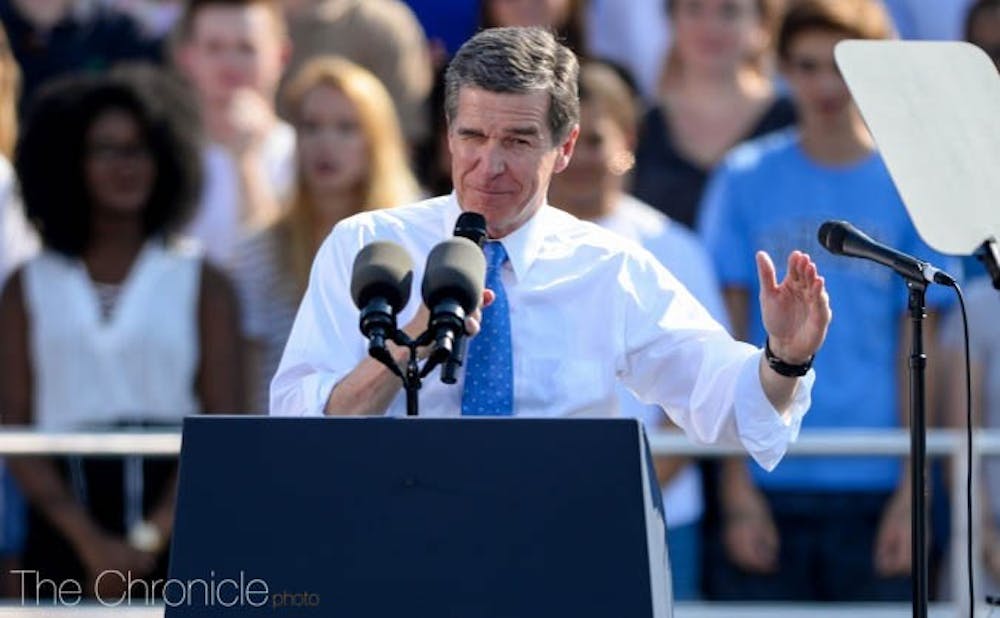Without federal guidelines to address climate change, several Duke professors said North Carolina's commitment to a state-level climate change alliance is mostly a symbolic gesture but still a meaningful one.
Gov. Roy Cooper announced Sept. 20 that North Carolina will join 13 other states and Puerto Rico in the U.S. Climate Alliance—a bipartisan coalition committed to upholding the 2015 Paris Climate Agreement objectives on climate change mitigation. The governors of California, New York and Washington co-founded the alliance June 1, shortly after President Donald Trump's decision to withdraw the U.S. from the Paris agreement.
“I don’t think there is any substitute for federal action [regarding climate change mitigation] but [joining the U.S. Climate Alliance] is still a valuable act,” said Billy Pizer, a faculty fellow at the Nicholas Institute for Environmental Policy Solutions and professor at the Sanford School of Public Policy.
Pizer said a state-level alliance demonstrates the diversity of perspectives in the United States on climate change mitigation, especially when the federal government deviates from its original climate commitment.
The alliance
Members of the alliance aim to achieve the national goal of reducing greenhouse gas emissions 26 to 28 percent from 2005 levels by 2025. They also want to meet or exceed the targets of the federal Clean Power Plan. But there are no uniform rules on how each state will meet this objective.
Joining the alliance is an executive act, not a legislative one, said Ryke Longest, director of the Environmental Law and Policy Clinic at the School of Law.
“This act has not made its way into any regulatory change at this point,” Longest said. “But it indicates the state executive branch is aiming at a different policy objective, namely to increase renewables and decrease reliance on fossil fuels.”
Longest said he expects Cooper’s climate agenda to encounter challenges from the Republican-dominated state legislative branch because of the partisan divide over climate change.
“I have never seen the question of energy choice being as partisan and politicized as it is today,” Longest said.
Among the member states of the U.S. Climate Alliance, only the governors of Massachusetts and Vermont are Republican. The rest—including those from the three founding states—are Democrats.
Longest said the composition of the alliance reveals the prevalent partisan polarization over climate change mitigation, even though the alliance is not a partisan organization.
“But it is already amazing that they have at least two Republican governors,” Longest said. “In today’s political atmosphere, it’s just hard to get two Republicans and 12 Democrats to agree on anything.”
He added that even without new laws, North Carolina will be able to meet its emissions abatement goal as long as it abides by its existing policies.
Climate change mitigation in North Carolina
North Carolina’s primary environmental regulation is the Renewable Energy and Energy Efficiency Portfolio Standard, or REPS. Launched in 2007, the REPS requires investor-owned utilities to supply 12.5 percent of their energy needs through renewable energy resources or energy efficiency measures.
Under the REPS, North Carolina has significantly increased its solar power installation, becoming the nation's second biggest producer of solar power.
In addition to reducing carbon emissions, promoting renewable energy such as solar power will potentially benefit the state’s economy, Longest said. Because North Carolina has scarce coal and natural gas reserves, fossil fuel industries will not generate as many local jobs as renewable energy industries.
Brian Murray, director of the Environmental Economics Program at the Nicholas Institute for Environmental Policy Solutions and the interim director of the Energy Initiative, said power industries in the United States have been transitioning to efficient energy resources for a decade due to market needs as opposed to environmental concerns.
“Electric power firms are already expecting a lower-carbon future,” Murray said. “Therefore, I don’t expect the governor’s declaration to create any resistance from [these firms].”
What the alliance can accomplish
Despite the absence of commitment at the federal level, Murray said local governments still have much to contribute, such as overseeing the development of more electric vehicle charging stations.
Megan Mullin, associate professor of environmental politics at the Nicholas School, added that joining the U.S. Climate Alliance allows each state to tailor their own climate policies. She noted that this individualization has both pros and cons.
On the one hand, decision-making will be more complex because in each state, the legislature will need to balance the diverse interests of the general population and private industries, Mullin said. However, each state is still able to exploit the most of its potential to mitigate climate change.
“A state like California or New York may be ready to move further than other states [in mitigating climate change],” Mullin said. “An alliance like this enables them to act faster and more aggressively than they [would] under certain national policies.”
The U.S. Climate Alliance also sends a positive signal to the outside world, Pizer said. It will encourage other countries to continue with their climate mitigation courses and pressure the federal government to take more action.
Still, state-level efforts are always suboptimal compared to a national commitment, he added. The potential effect of the U.S. Climate Alliance will be limited because some climate regulations need coordination from the federal government. For instance, Pizer said it is hard for each state to create separate transportation energy policies without a national standard.
“There is a limit of how far a state administration can go without new state laws,” Pizer said. “And a limit of how far a state can go without a federal law.”
Correction: This article was update Oct. 4 to note that Pizer is a fellow in the Nicholas Institute, not the Nicholas School.
Get The Chronicle straight to your inbox
Signup for our weekly newsletter. Cancel at any time.

